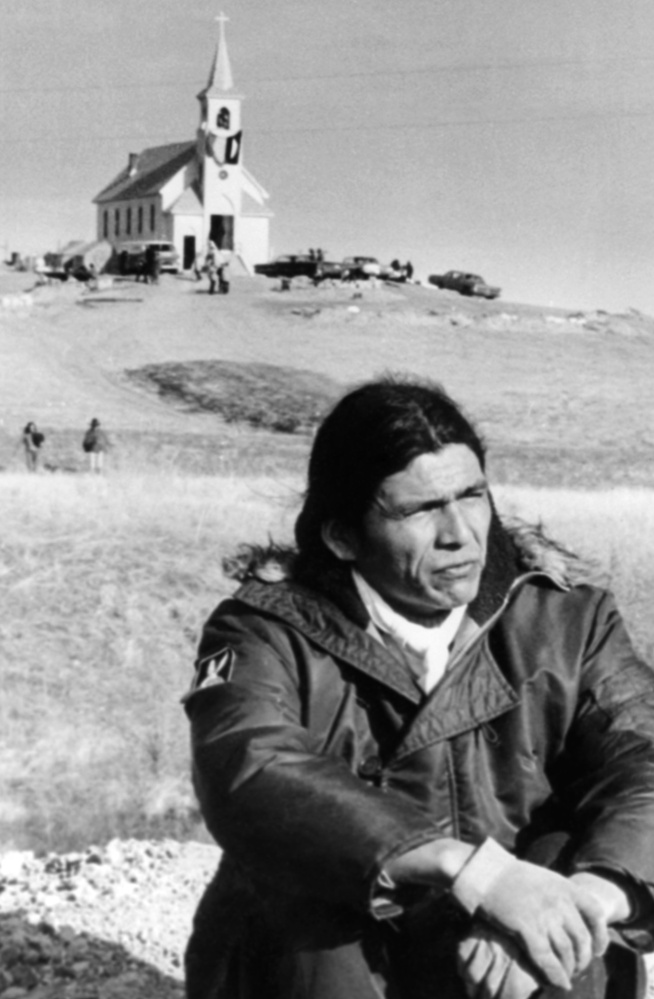Dennis Banks, who helped found the American Indian Movement and engaged in sometimes-violent uprisings against the U.S. government, including the armed occupation of Wounded Knee in 1973, died at age 80, his family announced Monday.
Banks, whose Ojibwe name was Nowacumig, was one of several activists who founded AIM in Minneapolis in 1968, and he was a leader of the group’s takeover of Wounded Knee on the Pine Ridge Reservation in South Dakota in 1973, in a protest against both the U.S. and tribal governments. The village had been the site of a massacre by U.S. soldiers in 1890 that left an estimated 300 Indians dead. The 1973 occupiers held federal agents at bay for 71 days; two Native Americans died and several agents were injured amid the frequent gunfire.
Banks died Sunday night at the Mayo Clinic in Rochester, Minnesota, surrounded by about 30 people, including siblings, children and grandchildren, said daughter Tashina Banks Rama. He had heart surgery earlier this month and was in high spirits until pneumonia he had contracted after the surgery took a turn for the worse on Friday, she said.
“Dennis Banks is somebody who had an indelible impact on history, not just in our native community but throughout our country,” said Anton Treuer, a professor of the Ojibwe language at Bemidji State University, citing how he demanded that the powerful take notice of American Indian concerns. “He was someone who was both loved and hated – depending on what circle you’re looking at.”
Banks and fellow AIM leader Russell Means faced charges stemming from the Wounded Knee occupation, but a judge threw out the case. However, Banks spent 18 months in prison in the 1980s after being convicted for rioting and assault in connection with a protest in Custer, South Dakota, earlier in 1973. He avoided prosecution on those charges for several years because California Gov. Jerry Brown refused to extradite him, and the Onondaga Nation in New York gave him sanctuary.
Banks also helped lead a takeover of the Bureau of Indian Affairs offices in Washington, D.C., in 1972 as part of a protest dubbed “The Trail of Broken Treaties.” And he was a participant in the 1969-71 occupation by Native Americans of Alcatraz Island, the site of the former prison in San Francisco Bay.
Banks’ family wrote on his Facebook page that as he took his last breaths, son Minoh Banks sang him four songs for his journey.
“All the family who were present prayed over him and said our individual goodbyes,” the family said. “Then we proudly sang him the AIM song as his final send-off.”
Banks lived near the town of Federal Dam on the Leech Lake Reservation in northern Minnesota and was a member of the Leech Lake Band of Ojibwe, one of the many bands of Ojibwe, also known as the Chippewa or Anishinaabe, living in North America. In the late 1990s, Banks founded a company that sold wild rice and maple syrup, trading on his famous name.
Send questions/comments to the editors.



Success. Please wait for the page to reload. If the page does not reload within 5 seconds, please refresh the page.
Enter your email and password to access comments.
Hi, to comment on stories you must . This profile is in addition to your subscription and website login.
Already have a commenting profile? .
Invalid username/password.
Please check your email to confirm and complete your registration.
Only subscribers are eligible to post comments. Please subscribe or login first for digital access. Here’s why.
Use the form below to reset your password. When you've submitted your account email, we will send an email with a reset code.